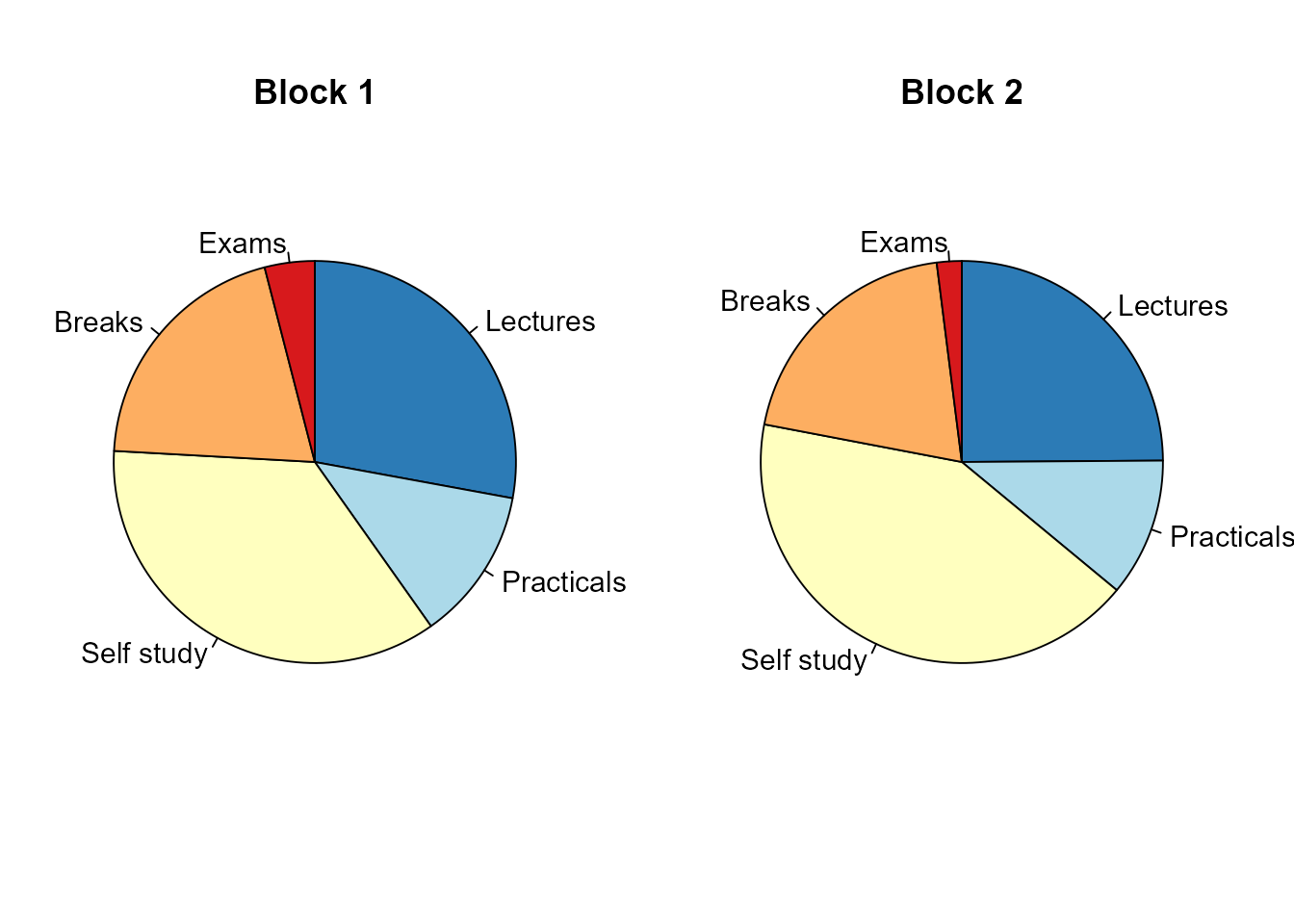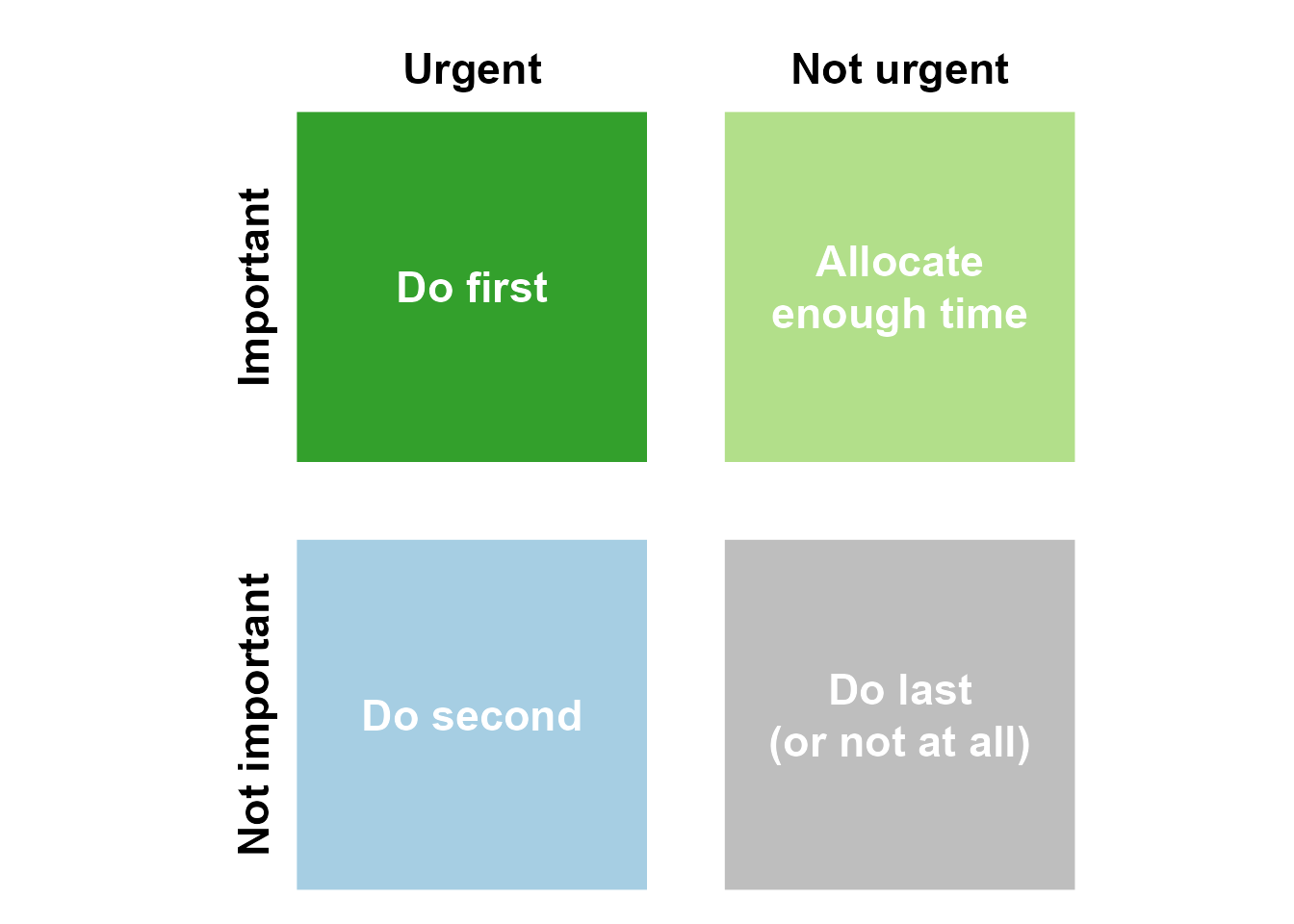Chapter 1 Time Management
In this chapter you will make your own study schedule and you will be introduced to the E-learning Skills Platform.
You’ve just entered the first year of your bachelor education and are now a full-time student. Studying at university is very different from learning at school. How should you allocate your time? Can you still spend as much time on sports, hobbies, and should you join a student association? What about committees?
To avoid stress from exams, deadlines and studying in general, you should consider spending at least some time on time management:
- How much time do you have?
- How should allocate your time?
Does time management work? Time management is not just another buzz word, but actually has a firm basis in science. A meta analysis of 158 articles on time management showed that there is at least a moderate effect on job performance, academic achievement and well-being.1 This is more or less in line with the conclusions from an earlier systematic review on time management.2
1.1 How Much Time Do You Have?
Let’s start by putting things into perspective. This is a full-time week of studying (38 hours):
![How a full-time week relates to the remaining hours in the week. The scientifically recommended amount of sleep for young adults is 7--9 hours per day.[@Hirshkowitz2015] The figure shows 9 hours of sleep so as not to exaggerate the remaining time.](figures/fulltime.png)
Figure 1.1: How a full-time week relates to the remaining hours in the week. The scientifically recommended amount of sleep for young adults is 7–9 hours per day.3 The figure shows 9 hours of sleep so as not to exaggerate the remaining time.
With an average 7–9 hours of sleep and 38–40 hours of study, you have at least 65 hours a week left to spend however you see fit. You could get a part-time job, play sports, spend time on your hobbies, go to a student association, spend more time studying, etc.
Time spent studying includes lectures, practicals and self-study. Here is what that looked like for a first year biology bachelor student in 2020–2021:

Figure 1.2: Breakdown of the total study time in the first two blocks as a biology bachelor student at Leiden University. Data collected from the schedule of the first 17 weeks of the cohort of 2020–2021.
As you can see, despite its many contact hours, a substantial part of your biology bachelor education consists of self study. This may have been inflated due to the COVID-19 pandemic, but even in a normal year, you will spend a large amount of time studying by yourself. That is why you should spend some time thinking about time management: What are you going to do with all that self-study time? Is it enough for you? Can you do with less? What about time spent traveling, can you do some preparation on the train? Or listen to some music and relax for a bit? Try and make conscious decisions about how you spend your day.
1.2 How Should Allocate Your Time?
A common misconception is that time management is about spending as much time as possible being productive. Instead, time management is about spending your productive hours as efficiently as possible. The faster you are done with learning, the faster you can unwind and let it all sink in. Sleep, sports, and having fun are every bit as important as the time spent studying. You should respect each of these and allocate enough time to them.
The most important parts of time management is meeting deadlines and avoiding stress from deadlines. A very simple rule of thumb for achieving this is by prioritizing your tasks by urgency and importance:

Figure 1.3: Variation on the Eisenhower matrix for prioritizing tasks.
At some point you will be so familiar with the student life that you may not feel the need for planning your time precisely anymore. Maybe you like wrapping up some work in the evening, or maybe in the weekends. All of this is perfectly fine: Eventually you should do whatever works for you.
In the first few weeks though, the key to success is to teach yourself some discipline. Write down a weekly schedule, including how you will spend self study time (reading a chapter of the book, preparing for the practicals, etc.). Not sure what to do on Monday? Start by prioritizing your tasks using figure 1.3. This helps you get a better idea of how much time you actually need, and will lower your stress.
Assignment 1
You can find more information on how to effectively manage your time over at the E-learning Skills Platform. A template for a weekly schedule is included in step 2. You can use this as a starting point.
- Write a schedule for next week:
- It should include all study time (self study or otherwise);
- Try to include non-studying activities as well (e.g. sports, travel time, time spent at a student association);
- For every self-study moment in the schedule, describe in a few words how you will use that time;
- Look ahead at the upcoming exam. Perhaps you can read a chapter of a book, or make a summary of the lectures thus far.
Submit your schedule as Excel, Word, or PDF file to Brightspace. Include your full name and student number. Deadline: 2 October
1.3 Further Reading (*)
- The Science of Time Management: A blog post explaining time management by comparing human concentration to how a computer schedules its tasks.
- The Eisenhower Matrix: A blog post elaborating on the classification of tasks based on urgency and importance.